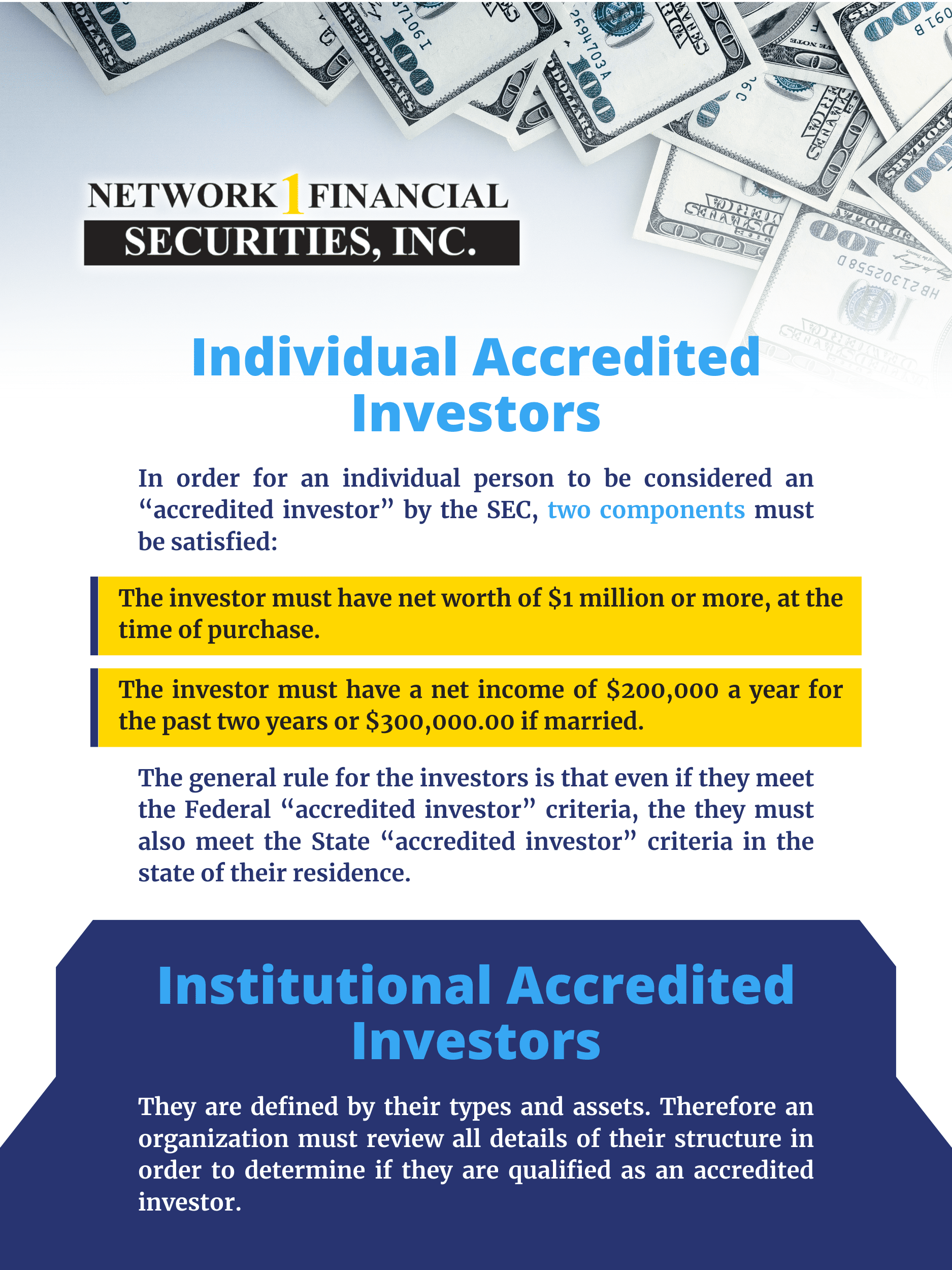All Categories
Featured
Table of Contents
An individual should have a total assets over $1 million, excluding the main house (separately or with spouse or partner), to qualify as a recognized capitalist. Showing adequate education and learning or job experience, being a signed up broker or financial investment expert, or having specific specialist qualifications can also certify an individual as an accredited investor.
Certified investors have accessibility to financial investments not signed up with the SEC and can consist of a "spousal matching" when determining qualification. Approved financiers may encounter potential losses from riskier investments and have to show financial refinement to take part in uncontrolled investments (series 65 accredited investor). Accredited investor standing issues since it figures out eligibility for financial investment opportunities not offered to the public, such as personal positionings, financial backing, hedge funds, and angel investments
Sec Verification Of Accredited Investor Status

To take part, accredited financiers need to approach the company of non listed protections, who may require them to complete a survey and offer economic files, such as income tax return, W-2 forms, and account statements, to validate their condition. Rules for accredited investors are managed by the U.S. Stocks and Exchange Commission (SEC), making certain that they satisfy particular monetary and specialist requirements.
This expansion of the recognized financier pool is intended to preserve investor protection while supplying greater accessibility to unregistered financial investments for those with the required economic elegance and danger tolerance. - sophisticated investor requirements
Accredited Company
Property syndication is rather similar to REITs due to the fact that it additionally includes merging sources to acquire real estate investments. A syndication bargain is when several investors merge their resources together to purchase a single actual estate residential property. This deal is put with each other by a syndicator, additionally referred to as the basic sponsor.
These capitalists will provide many of the resources required to get the property. The difference with REITs is that you can choose what submission deals to get involved in. If you believe in the realty home being syndicated, you can join as one of the passive investors. Property syndication can be finished with any type of kind of genuine estate, but multifamily syndication is one of the most preferred kind since multifamily residential or commercial properties usually generate a great deal of consistent revenue.
Additionally, these large residential or commercial properties are usually harder to get as a single capitalist, which is why submission is an optimal configuration. Investors can get involved in multifamily actual estate spending with a much reduced minimal investment.
Recognized financiers do not have to collect rental revenue, deal with tenants, handle emergency situations, invest money on fixings, and so on. Either the syndicator will hire a 3rd party residential or commercial property supervisor to do this or they will certainly manage it themselves.
Occasionally the syndicator has a bigger percent of the equity. The capital is typically split amongst the participants. This implies capitalists get passive revenue from rents, and the eventual building sales. This is based upon what portion of the building they possess, relying on the bargain structure.
Etrade Accredited Investor

Our opinions are our very own. A certified financier is a person or organization that can invest in unregulated securities.
Unregistered protections are naturally risky yet commonly offer greater prices of return. If you've ever found a financial investment offered just to so-called accredited financiers, you have actually likely wondered what the term suggested. The label can put on entities varying from substantial financial establishments and rich Fortune 500 business, completely down to high-earning houses and also individuals.
Selling to approved investors is simply among those exceptions, covered by SEC Rule 501 under Regulation D of the Securities Act of 1933. The policy was prepared as a federal government feedback to the Great Depression, approving market access to smaller sized companies that may or else be crushed under the costs going along with SEC enrollment.
Capitalists without accreditation can handle the full breadth of licensed protections like stocks, bonds, and mutual funds. They can also build up wealth, acquisition property, build retirement portfolios, take risks, and gain benefits the biggest difference remains in the range of these ventures. Among the benefits of being a certified investor is that as soon as you attain this status, it "opens" accessibility to products not available to the general public, such as hedge funds, financial backing funds, personal equity funds, and angel investing.
As an example, the SEC takes into consideration hedge funds a more "flexible" investment technique than something like mutual funds, due to the fact that hedge funds make use of speculative methods like take advantage of and brief marketing. Given that these complicated products need added research study and understanding, financiers need to demonstrate that they understand the threats included in these types of financial investments before the SEC fits with them diving in
While numerous are mainly acquainted with the SEC's consumer protection initiatives, the regulatory authority's responsibilities are in fact twofold. Along with safeguarding capitalists, it's likewise accountable for funding development basically, aiding the market build up resources. To ensure that those 2 initiatives aren't in conflict, it's in some cases required for the SEC to pair up high-risk, high-reward chances with ideal financiers.
Accredited Investor Crowdfunding
One assists navigate the unregulated market, and the various other will certainly float you to safety and security must the waves threaten. On the other hand, the typical financier is safe on the beach or paddling in the shallows, secure under the careful look of the lifeguard (i.e., the SEC). Safeties that are offered to accredited financiers are provided with exclusive offerings, which may feature fewer guidelines than safeties supplied to more routine capitalists.
By Percent - January 11, 2021 When it concerns purchasing stocks and bonds, basically any person can spend. As long as you're over the age of 18 (or 21, in some states), not trading on details, or otherwise investing as component of a problem of rate of interest, you can be a component of public markets whether you have $1 or $1 million.
Certain investment cars including those on Percent are just available to a class of investors lawfully specified as These capitalists have the specific approval from regulatory bodies based on a narrow collection of criteria to invest in certain types of investments in private markets. Who can be a recognized capitalist? Better yet, why are certified capitalists a thing in the very first location?
The Stocks and Exchange Compensation (SEC) ultimately adopted regulation 501 of Law D, which formalized who can purchase personal offerings and defined the term "accredited financier" a term that was later on updated in 2020. A recognized financier is any individual who fulfills any of the following requirements: Investors with made income that went beyond $200,000 (or $300,000 with each other with a partner) in each of the previous 2 years, and expects to fulfill the exact same standards in the present year.
If you are wed to a recognized financier and share financial resources, you are now additionally an accredited investor.) Those that are "knowledgeable employees" of a private fund. Limited Responsibility Business (LLCs) and Household Workplace entities with $5 Million possessions under management. SEC- and state-registered financial investment advisers (but not reporting advisors) of these entities can additionally now be thought about accredited capitalists.
Qualified Investor Us

As an example, if you have an internet well worth of over $1 million (not including your key property/residence), made $200,000+ a year for the last 2 years, or have your Series 7 license, you can make financial investments as an accredited financial investments. There are numerous other credentials (as you can discover over), and the SEC intend on adding much more in the near future.
Given that the early 1930s, federal government regulators have located it tough to protect financiers in personal offerings and safety and securities while all at once maintaining the growth of startups and various other young firms - companies that lots of think are accountable for the majority of job growth in the USA - non accredited investor meaning. Stabilizing this task had actually been leading edge of the mind of the Securities and Exchange Compensation ("SEC") for years
Latest Posts
Tax Sale Overages Course
Back Tax Houses For Sale
What Is Tax Lien Certificates Investing